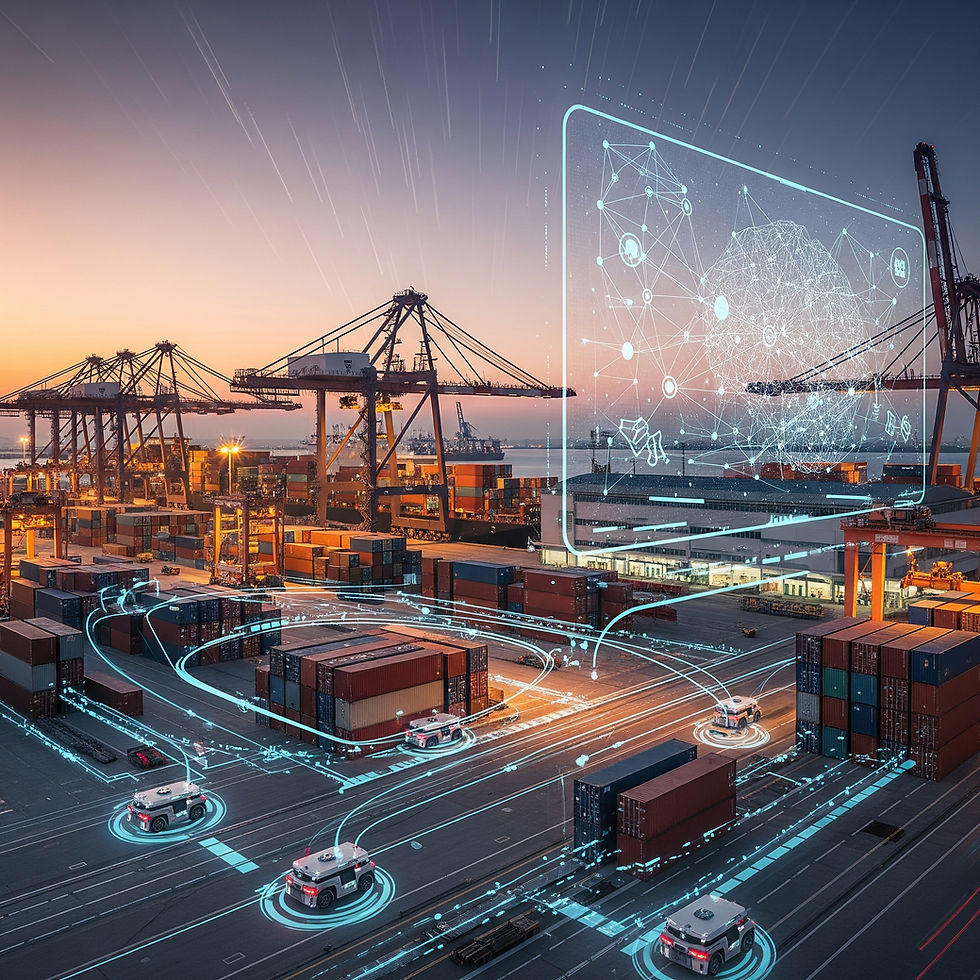Workflow Orchestration vs. Agentic AI in Logistics: Making the Right Choice
- Aug 26, 2025
- 3 min read
Updated: Sep 4, 2025
As artificial intelligence gains traction in the logistics industry, many supply chain leaders are asking: What is the difference between traditional automation and agent-based AI? More importantly, when should you use one over the other?
In this article, we'll explore the distinction between workflow orchestration (deterministic automation) and agentic AI (autonomous, adaptive systems), helping you understand when each approach is best suited for your logistics operation.
At Splice we provide workflow automation purpose-built for the logistics industry — similar to Zapier, but tailored to shipping, freight, and supply chain integrations. We do not currently offer agentic AI, in part due the lack of suitable data required to power the models. Instead, we’re actively educating the market on where it fits, where it doesn’t, and how it complements existing tools like ours.

What Is Workflow Orchestration?
Workflow orchestration refers to predefined, rules-based automation. In logistics, this often means connecting systems via event triggers:
Example: "When a shipment is created in the TMS, send a confirmation email and update the ERP."
Orchestrated workflows follow clear logic:
If A happens, do B
If B fails, alert someone
These systems are predictable, transparent, and highly reliable. They're ideal for structured processes like:
Booking confirmation
Status updates
Document generation
API-to-API data syncing
Platforms like Splice excel at this. With no-code tooling, teams can automate hundreds of repetitive tasks without writing code.
What Is Agentic AI?
Agentic AI is a newer paradigm, powered by large language models (LLMs) like OpenAI's GPT-4. These systems can:
Understand goals in natural language
Choose tools based on context
Plan actions and reason about the next best step
Instead of being explicitly told what to do, agents can interpret vague instructions like:
"Find the cheapest way to get this pallet to Hamburg."
Then:
Search multiple carrier APIs
Compare rates and transit times
Make a booking or ask for clarification
Agents operate more like digital employees than process pipelines. They're ideal for messy, complex, or exception-heavy tasks.
Side-by-Side Comparison of Workflow Orchestration and Agentic AI
Feature | Workflow Orchestration | Agentic AI |
Logic Type | Deterministic | Adaptive, goal-based |
Setup | Trigger-action rules | Prompt and context driven |
Error Handling | Defined fallbacks | Dynamic replanning |
Tool Usage | Prewired steps | Chosen at runtime |
Input Type | Structured events | Natural language, unstructured data |
Transparency | Fully auditable | Some black-box behavior |
Best For | Repetitive, structured tasks | Dynamic, edge-case-heavy workflows |
Choosing the Right Tool for the Job
Use Workflow Orchestration When:
You have stable, well-defined business logic
Accuracy and compliance are essential
You want full auditability and control
Tasks involve integrating known systems (TMS, ERP, carrier portals)
Use Agentic AI When:
Human reasoning is currently required
Inputs are vague (emails, PDFs, messy disorganized portals)
The process changes often or isn't fully defined
Exceptions dominate the workload (requotes, reroutes, delays)
Hybrid Is the Future
Most organizations won't choose just one. Instead, they'll use agents to assist or trigger orchestrated workflows:
Agent receives an email with a shipping request → parses it → triggers a booking workflow → monitors the outcome → follows up if needed
This hybrid model offers both reliability and flexibility.
Why Splice Focuses on Orchestration First
While agentic AI is exciting, it's not yet ready to replace deterministic logic for critical operations like:
Booking freight with specific compliance rules
Customs document submission
Billing and financial integrations
Why isn’t agentic AI a viable replacement for workflow orchestration?
For one, agentic AI requires accurate, structured, and accessible data to make sound decisions. Many organizations still struggle with siloed, outdated, or low-quality data, which can cause the AI to "hallucinate" or make incorrect judgments, leading to costly mistakes and compliance risks. Technical issues can be compounded by cultural resistance to AI and skill gaps to provide oversight of the AI.
Our platform helps logistics teams eliminate manual work safely, scalably, and transparently. We prioritize:
API integrations with carriers, brokers, and ERPs
Event-driven workflows for speed and reliability
Human-in-the-loop steps when needed
We believe agentic AI will be a powerful companion to these systems — but not a replacement.
The Upshot
Agentic AI and workflow orchestration serve different, complementary purposes in logistics:
Orchestration is about reliability and structure
Agentic AI is about flexibility and autonomy
Choosing the right one depends on the problem you're trying to solve. As the technology matures, forward-thinking logistics companies will combine both.
Ready to Automate Smarter?
Explore our workflow automation platform for logistics
Talk to our team about use cases in your operation
Subscribe below to our newsletter to learn more about agentic AI



Comments